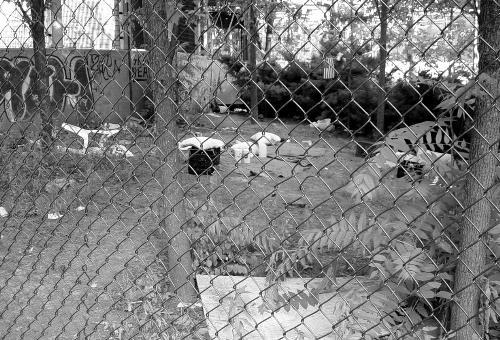
News
Cambridge Residents Slam Council Proposal to Delay Bike Lane Construction

News
‘Gender-Affirming Slay Fest’: Harvard College QSA Hosts Annual Queer Prom

News
‘Not Being Nerds’: Harvard Students Dance to Tinashe at Yardfest

News
Wrongful Death Trial Against CAMHS Employee Over 2015 Student Suicide To Begin Tuesday

News
Cornel West, Harvard Affiliates Call for University to Divest from ‘Israeli Apartheid’ at Rally
Porter Sq. Focuses On Crime

Last Tuesday, a man ran out of Cambridge Music with a stolen guitar in hand and two store employees in hot pursuit.
The chase took a circuitous route around Porter Square, ending when the thief threw the guitar over a high wall and proceeded to hurl himself over as well.
When his pursuers heard a loud crunch on the other side of the wall—the man apparently landed on the guitar—they gave up chase.
Meanwhile, back at the shop, owner Dennis Keller struck up a conversation with an acquaintance who had just stepped in.
Oblivious to the events taking place as he spoke, Thomas Lenthall, whose wife owns a nearby Scottish imports shop, asked Keller if he would be coming to the Porter Square Neighbors Association meeting later that week. The topic was to be increased neighborhood crime.
“It was as if it was scripted,” said Keller, who did come to the meeting two days later in the basement of the Metropolitan Baptist Church.
Nearly 40 people attended, most of them local store owners concerned that more and more people who seem to be under the influence of drugs and alcohol are hanging out in the Square.
“It’s not as bad as Central Square or Harvard Square,” says association President Dave Reed, “but we don’t want it to become like there here.”
“The message will certainly get out to them that we’re organized,” he says. “People make a nuisance of themselves when they’re allowed to.... One or two aren’t a problem, but right now everyone has had some pretty ugly experiences.”
Shop owners complain that rowdy behavior—calling out obscenities and harrying passers-by—is scaring customers away. At the meeting, many illustrated their complaints with stories of petty crime and threatening encounters in the past few months.
Though all say they have observed a relatively recent and pronounced rise in trouble in the streets of Porter Square, they do not agree on when drifters and drug users started becoming such a problem.
Many claim that the problem has increased since the end of summer, when budget cuts forced the city to drastically reduce the hours of local drug rehabilitation centers and close down several homeless centers.
But others say that the problem dates back at least a year, the result of something they call the “balloon effect.”
“They rotate, like a balloon that, when you squeeze it, it pops out on the other side,” Keller says.
Their theory is that the loiterers and hangers-about who have been disruptive lately came from elsewhere in Cambridge. Perhaps they were ousted—as the Porter Square Neighbors Association hopes to do—by a similar coalition of unhappy shopowners, say Keller and others.
Cambridge Police Department spokesperson Frank D. Pasquarello points to growing “concerns” since the city cut back the rehabilitation centers.
In response to rising complaints, he says, the department has sent more officers to the Porter Square area within the last two months.
Even so, the neighbors association is lobbying for more significant increases in police presence.
Cambridge Police Sergeant Dennis O’Connor, who had been invited to answer questions at the association meeting, promised that the police would immediately start devoting more time to Porter Square’s problems.
“I’ll make sure as of tomorrow that there’s more visibility here,” he said.
He also said the Porter Square neighborhood needs to emphasize “consistency” in the way it deals with the problem. People should refrain from giving to panhandlers and know how to alert the police to disruptive activity without relying on 911.
The association is producing a pamphlet to educate the community about these issues, including a list of non-emergency police numbers.
Representatives from the nearby North Charles Institute for the Addictions, who attended the association meeting, say drug users often tend to form communities such as the one that seems to be plaguing Porter Square.
“If you’re addicted to drugs other than what’s legal, you do have to find networks of people who abuse the same drugs,” says Sharon G. Hartunian, a clinical supervisor at the institute.
One association member asked whether shopkeepers could provide the institute with photographs of disruptive individuals, so that it could take measures against them if they happened to be clients.
But Hartunian and her colleague said they had no jurisdiction outside of the clinic. They acknowledged that a small number of their clients are prone to disruptive and frightening behavior. But as for what goes on beyond the clinic’s doors, they said, the institute can only “ask them to be respectful and mindful of our reputation in the community.”
Many association members say that even if they have sympathy for derelicts, they are angry and frustrated by the disturbances in the square.
Evelyn M. Murray, Lenthall’s husband and owner of Atholl Brose Scottish Imports, says her clients come largely from rural areas and tend to be easily turned off by unruly loiterers.
“They’re scared of the big city,” she says, adding that Porter Square has traditionally been known as less intimidating than other parts of Cambridge.
“I’m sympathetic to the homeless,” she says, “but I’m not sympathetic to those who yell, use bad language and worse things than that.”
—Staff writer Eugenia B. Schraa can be reached at schraa@fas.harvard.edu.
Want to keep up with breaking news? Subscribe to our email newsletter.
